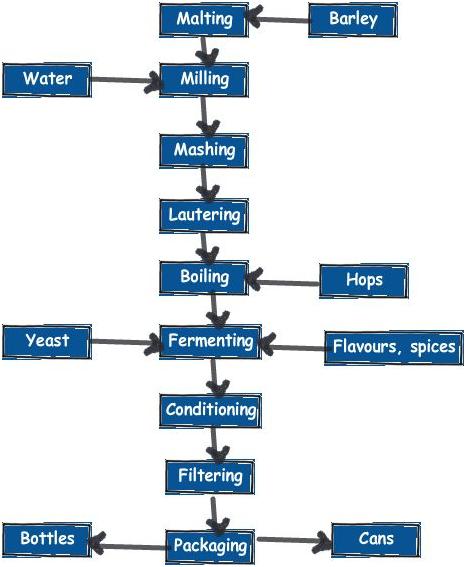
Beer Brewing Process
Brewing of alcoholic beer requires a series of steps, to make a good beer. The
brewing process goes through the phases of Malting, Milling, Mashing, Lautering,
Boiling, Fermenting, Conditioning, Filtering, and Packaging.
a. Malting: Here there is the conversion from carbohydrates to dextrin and
maltose. The grain generally used as the raw material is barley, which as a cereal
can be preserved for a long time after harvesting. The malted barley gives Beer
its characteristic taste and color.
b. Milling: The malt is mixed with water to complete the conversion of starches
in the grain to sugar.
c. Mashing: This process converts the starches released during the malting
stage, into sugars which is then used in the fermentation process.
d. Lautering: The liquid which is extracted from mashing has sugar, is then
separated from the grains. It is then called as wort.
e. Boiling and Hopping: The wort is properly boiled to sterilize and to ensure
that there is no infection. Hops are then added during this stage of boiling to add
flavor and aroma to achieve the sweetness of the malt.
f. Fermenting: In the fermenting process, yeast is added to produce the Beer.
The yeast helps to break down the sugars extracted from the malt to generate
alcohol and CO2.
g. Conditioning: The fermented Beer is not desireably stable which lacks
required level of carbonation, taste and aroma and it contains suspended
particles. Conditioning activity helps to reduce the levels of these undesirable
compounds and enables to produce more desireable product.
h. Filtering: Filtering is the process which produces the clear, bright and stable
Beer by removing excess yeast and unwanted solids, like hops or grain particles
from the fermented and conditioned Beer.
i. Packaging: The final finished beer is now ready to be bottled, kegged and
canned.


HOME
ABOUT US
BREWING PROCESS
GOLDEN BEER
DARK BEER
MANGO BEER
KEGS BEER
CHIANG MAI BEER
GRIZZLY BEER
AFFILIATES
CONTACT US
Call : 866 219 4736
Naturally brewed for spicy couisine